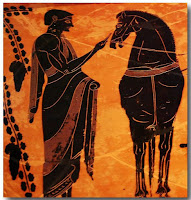I
spent half the week in Philadelphia giving a public lecture on that city’s most
famous poet at the annual Ezra Pound International Conference. I never actually
liked much of Pound’s poetry; his famous Cantos are crammed with allusions to
other poets so dense that you need a literary encyclopedia to make sense of
them. And then there were his silly
hairdos and the fascination with Fascism.
 |
| Questionnable Coiffure |
But
Pound did almost single-handedly free poetry from the rhetorical verbiage and conventional
verse forms of the 19th century, stress the importance of
crystalline imagery, and introduce the idea of verse libre and singable verse, verse cantabile. This makes an aural impact by careful handling of vowel
sounds. He cannot be written out of the history of aesthetics however hard some,
repelled by his politics, have tried.
 |
| Pound is Hellenic Maiden Second from Left |
I
argued that the primary reason he was able to invent a whole new kind of lyric
song was his experience performing in the chorus of a Greek tragedy by
Euripides, Iphigenia in Tauris in
1903, at the age of 17. This meant learning off by heart nearly 300 lines of limpid
lyric poetry which sounds, when sung or spoken out loud, very like much of Pound's most
beautiful, melodic lines, e.g. ‘Eyes,
dreams, lips, and the night goes’, or ‘In the gloom, the gold gathers the light
against it.’
 |
| 'ecstasies of emotion' |
Pound
as Hellenic Maiden made an impression which his friend William Carlos Williams
regarded as hilarious, ‘in a togalike ensemble topped by a great blond
wig at which he tore as he waved his arms about and heaved his massive breasts
in ecstasies of emotion’. Hilda Doolittle, however (better known as the poet
H.D.), developed a crush on cross-dressed Pound and thenceforward spent most of her life
imitating or translating Euripides.
 |
| Poster advertising the Play |
I believe that the older Pound was in denial about the importance of
Euripides to his own development because Euripides was associated, through his popular
translator Gilbert Murray (co-founder of the League of Nations which became
the UN), with the liberal and humanitarian causes which Pound came to despise. I
also learned on Tuesday that Pound corresponded with fellow-Modernist-of-dodgy-politics T.S. Eliot in an
excruciatingly racist parody of what they regarded as the diction of African
American people (although they called them by another, less respectful name).
 |
| The Messenger spoke Greek skilfully & was talked about for years |
Which
all goes to show that the Classics lurk beneath stones where nobody has suspected
them (like the form and sound of Modernist free verse) and do indeed belong to
everyone. This includes august poetic types I personally would rather not hang out with, even at such a monumental performance of my very favourite Greek play.















